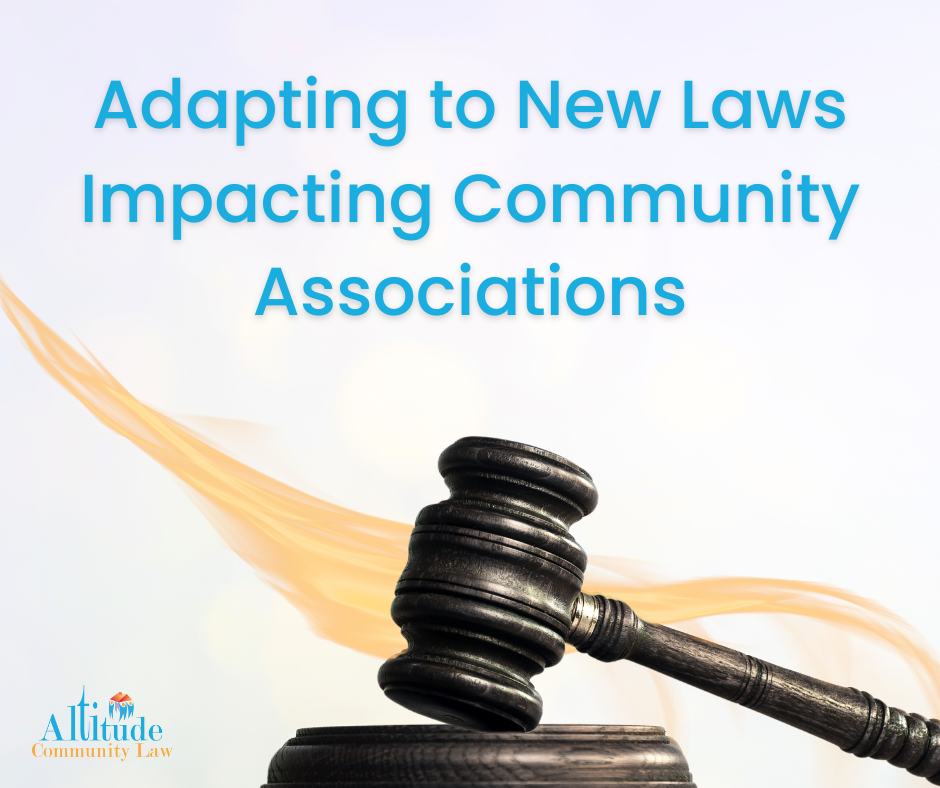** This article was originally published in in the CAI-SOCO Community Connections Magazine Q1, 2024 **

It seems like every time we start to get used to how things are, a new law gets thrown at us and we have to adapt again. My practice specializes in debt recovery for community associations and just since 2020, we have been clobbered with new laws and requirements relevant to collections under COVID, then restrictions on collections in general, then restrictions on collections specific to community associations. Is it frustrating? Of course. Is it also going to continue to happen? Certainly yes. So, rather than getting worked up and angry every time it happens, I’ve made the conscious choice to accept it. Change is an inevitable constant in life and community associations are no exception. As a Board Member or manager in the community association industry, what can and should you be doing to stay on top of the ever-changing legal landscape?
- Stay Educated: First and foremost, make sure you are aware of what’s going on in the world of community association legislation. You don’t need to try to follow every bill introduced in the legislature. Sign up for attorney and/or CAI newsletters and blogs and let them do the work for you. Each time a law is introduced that could impact community associations, the industry attorneys are paying attention. We are working behind the scenes to prepare for whatever our clients will need once the law becomes effective, if it passes. By the time the Governor signs the bill into law and an effective date is official, it’s time to get the word out about next steps for our clients. CAI and many attorneys issue updates on current legislation and what they mean for community associations. Both also provide webinars and in-person classes with updates and helpful information, including those focused solely on legislative updates.
- Take action: Watch for calls to action issued by CAI or other organizations you trust. If you feel strongly about a particular issue, follow up and have your voice heard.
- Contact your association’s attorney with questions: Any time there is new community association legislation, there will be questions. Remember that you have resources available to you! Contact the association’s attorney and find out the answers to your questions. You might ask any or all of the following: Does this impact me and my association? Do I need to do anything? Do I need to update any practices or policies to reflect the new laws? If these new requirements conflict with my association’s current governing documents, which do I follow?
- Notify your homeowners of the rule changes: Providing open communication and transparency with your homeowners is usually very welcomed. This is especially true if there are changes that your homeowners will notice or be impacted by. Relevant information can be included in a community newsletter or the association’s website. Providing information to homeowners can have the dual benefit of answering questions people didn’t even know they had and also increasing a sense of confidence in the Board’s knowledge and leadership. If a Board is keeping up on current legislation impacting associations and homeowners know that, they are more likely to have trust in their Board to run the community well.
- Follow the new rules: If a new law impacts you, make sure you are following it. Updating a policy is not enough if you don’t also follow the updates.
- Trust yourself: If someone says something that rings a bell, say something. For example, if someone at a Board Meeting says something about towing rules and you believe you may have heard something about that fairly recently, trust yourself! First, you are correct. There was recent legislation about towing. Second, make a note to yourself to look into it to be sure your association is up to date and compliant with current legislation.
Most importantly, remember to stay flexible. The laws impacting community associations are always evolving. Sometimes we like the changes and other times we don’t, but change is inevitable so let’s be prepared for it!